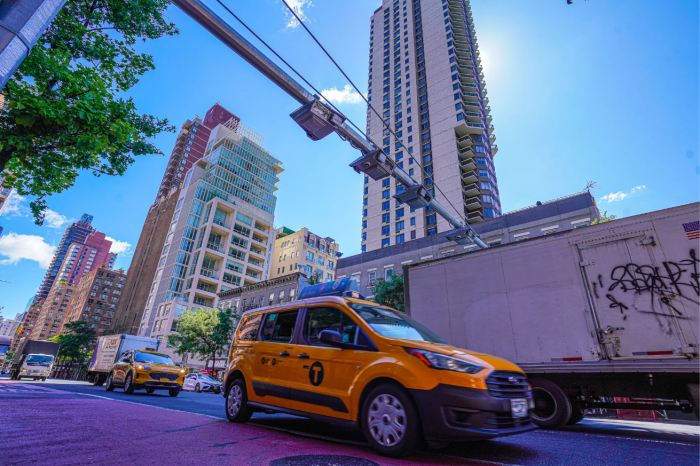Court’s rationale attacked; pressure on political leaders pledged
Advocates for same-sex marriage and gay couples who sought to marry expressed sadness and directed biting comments at New York’s highest court after it ruled that it is constitutional to bar same-sex couples from marrying.
“Today I was reviewing the court’s ruling and I started to cry because I thought how many years are going to go by without our relationship being acknowledged,” said Cindy Bink, 46, who stood with her partner, Ann Pachner, 60. “Ann and I have been together for 18 years.”
Bink and Pachner were one of 44 gay and lesbian couples, represented in four separate suits, whose cases were argued before the Court of Appeals on May 31. The court’s 4-2 ruling, made public on July 6, asserted that marriage in New York should remain between a man and a woman.
Judge Robert S. Smith wrote one of the two opinions for the majority. Judge George Bundy Smith, who is seen as one of the court’s most liberal members, joined the majority. Chief Judge Judith S. Kaye wrote the dissent and Judge Carmen B. Ciparick joined the dissent.
Smith applied the rational basis legal standard to decide the case. Such a test presents the government with the lowest burden when arguing that a law is constitutional. Smith asserted that the governmental goal of promoting stable families, headed by a man and a woman, in which children can be raised, was a sufficient purpose to maintain marriage as limited to one man and one woman. He did not explain how excluding gay and lesbian couples from marriage advances that goal or how allowing such couples to wed might harm that goal.
“We argued that excluding same-sex couples from marriage simply doesn’t advance the various different interests that Judge Smith identified as being the reasons to keep us out,” said James D. Esseks, litigation director at the Lesbian, Gay, Bisexual and Transgender Rights Project of the American Civil Liberties Union (ACLU). “Keeping same-sex couples out of marriage doesn’t get any more straight people to have kids. It doesn’t get any kids who are currently being raised by gay people to be raised by straight people. None of that makes sense. Keeping us out doesn’t advance those things.”
Roberta Kaplan, an attorney with the law firm Paul, Weiss, Rifkind, Wharton & Garrison who argued before the court on behalf of couples represented by the ACLU and the New York Civil Liberties Union (NYCLU), was blunt in her assessment.
“I’m going to stand here before you and call a spade a spade,” she said at a July 6 press conference. “This decision is based only on prejudice.”
Arrayed behind the lawyers were several of the couples who have fought these lawsuits for the past two years.
“We are deeply disappointed and saddened to hear that the Court of Appeals has decided not to grant gay and lesbian New Yorkers the right to marry,” said Lauren Abrams, 41. She and her partner of eight years, Donna Freedman-Tweed, 45, have two sons.
“We have accepted all the responsibilities that come with marriage, but today we have been told that because we are both women our relationship and our family are not deserving of the rights that go along with it,” Abrams said.
Donna Lieberman, the NYCLU’s executive director, took some solace in the dissent.
“Two justices, including the chief justice, recognized eloquently… the right of same-sex couples to engage in the most fundamental act of a committed relationship, to get married and protect themselves and their children,” she said. “Sadly, the rest of the court has turned its back on same-sex couples who fall in love, who build families just like straight couples do, and who need those protections desperately.”
But for the couples and the lawyers, the dissent was still cold comfort.
“It’s a sad day in New York,” said Susan Sommer, senior counsel at Lambda Legal, which represented several couples. “The majority turned its back on these families… The majority held that there is no violation of our state’s Constitution when loving, committed same-sex families are denied the right to marry and denied equality under the law.”
There was general agreement at the press event that the gay and lesbian community would have to turn to the state Legislature to win the right to marry.
“We’ll also push Mayor Bloomberg and Attorney General Spitzer to walk the walk finally,” Lieberman said. “They’ve said one thing in public up until now and done another thing in court… It’s time for them to do the right thing on a consistent basis.”
New York City and the state were named as defendants in the lawsuits. Mayor Michael R. Bloomberg and Eliot Spitzer have both said they support gay marriage even as they have argued against it in court. The City of Albany, named as a defendant in one case, argued against gay marriage. The City of Ithaca, also named as a defendant, declined to submit briefs or participate in oral arguments.
Alan Van Capelle, executive director of the Empire State Pride Agenda, the statewide gay lobbying group, vowed that gay marriage would become a reality in New York.
“It took 31 years to pass the Sexual Orientation Non-Discrimination Act,” he said. “Thirty-one years for New York State to say it was wrong to fire someone from their job, kick them out of their house, or deny them credit because of their sexual orientation. I promise the couples up here that it will not take 31 years to win marriage in the state of New York. It will only take a few short years.”
Of the gay marriage bills in Albany, the 151-member Assembly has 22 sponsors and supporters and the bill in the 62-member state Senate has nine sponsors and supporters.
gaycitynews.com


































